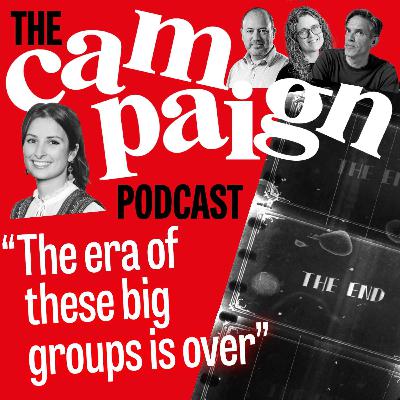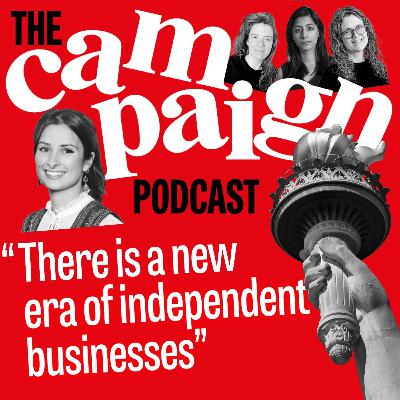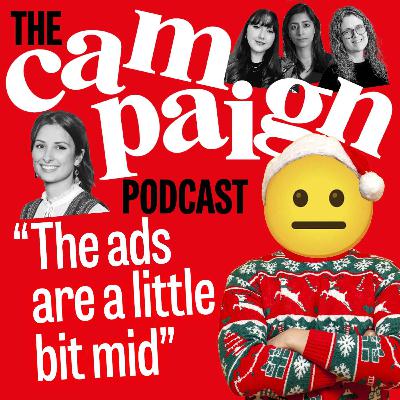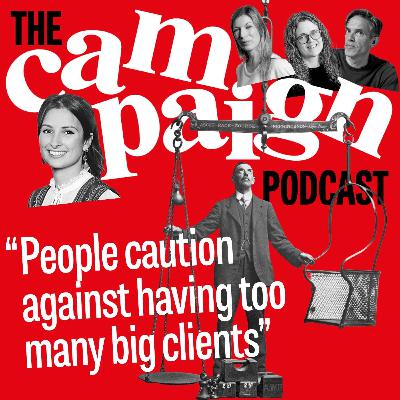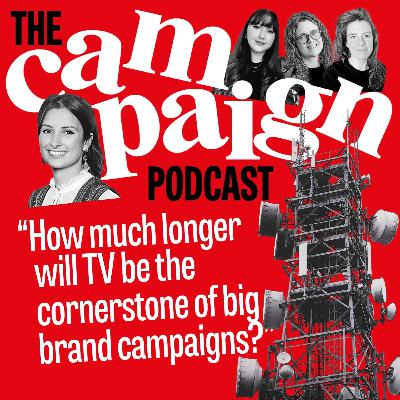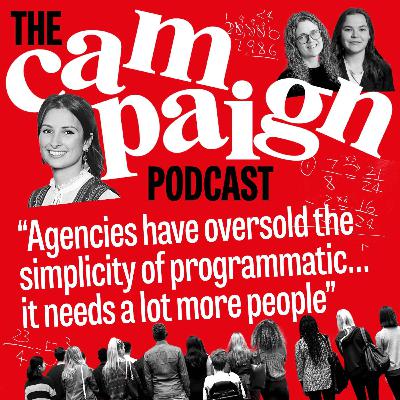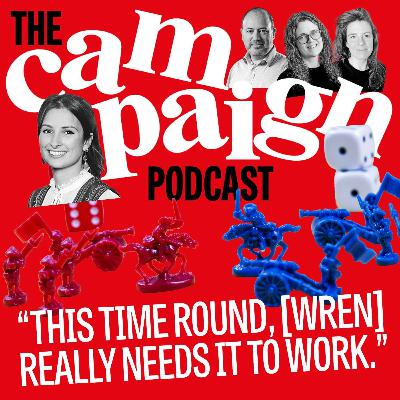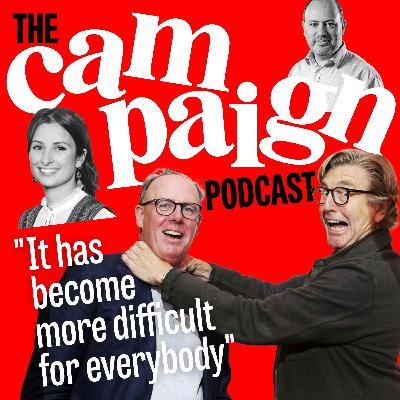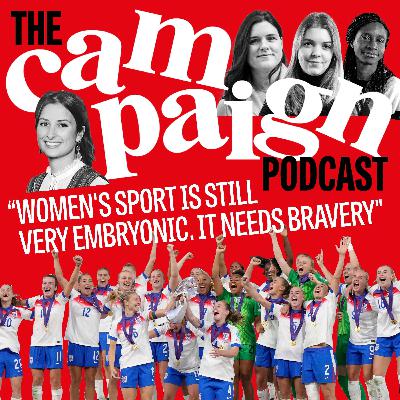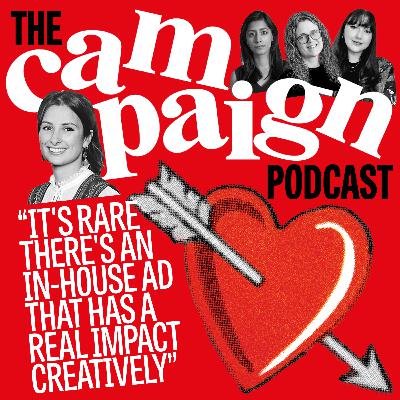Discover The Campaign Podcast
The Campaign Podcast

The Campaign Podcast
Author: Campaign
Subscribed: 158Played: 3,598Subscribe
Share
© Campaign
Description
Welcome to Campaign magazine's award-winning podcast, our weekly look at the biggest stories, campaigns and important issues in UK advertising and media. Presented by Campaign's editorial team. Read more at http://www.campaignlive.co.uk/resources/podcasts
Hosted on Acast. See acast.com/privacy for more information.
371 Episodes
Reverse
Does January feel like a week ago or five years? The past 12 months have brought with them a lot – a mega-deal, cyber attacks, agencies renamed, new chief executives, trends fading in and out, redundancies and, of course, AI.In the final podcast episode of the year, Campaign takes a look back over 2025 at some of the most memorable moments of the year, revisiting the top stories, reviewing who was the most talked about and picking out those moments that would be better forgotten.Tech and multimedia editor Lucy Shelley hosts the episode and is joined by Campaign UK media editor Beau Jackson, reporter Eszter Gurbicz and editor Maisie McCabe.Further reading:Lucky Generals: ‘A creative company for people on a mission: that is still our north star’White Lotus star Aimee Lou Wood will no longer appear in M&S Christmas adSantander appoints Publicis to global creative and media businessWPP recruits Microsoft exec Cindy Rose to replace Mark Read as CEOCampaign's top 10 most read stories:Group M tells staff about redundancies as restructure hits UKWPP mandates four days per week in officeOmnicom reveals huge agency shake-up, unveils new leadership, cuts 4000 jobsAgency pay revealed: a squeezed middle and a boost for bossesSchool Reports 2025: A to ZWPP employees push back on return-to-office policy with petitionRevealed: Latest hybrid working policies across 'big six' agency groupsWPP Media unveils new UK leadership structure under Brian Lesser overhaulGroup M axes global agency CEO roles in major centralisation pushWPP set to drop Group M brand in media shake-up
Hosted on Acast. See acast.com/privacy for more information.
Waitrose, John Lewis, Tesco... the Christmas ads are all out and it's time for them to start selling. But what do adland's creative leaders make of the campaigns?Creativity and culture editor Gurjit Degun hosts this extra Private View episode of The Campaign Podcast, reviewing the top festive ads with David Kolbusz, chief creative officer at Orchard, Chaka Sobhani, the newly appointed global chief creative officer at TBWA\Worldwide, Richard Brim, founder and chief creative officer of Ace of Hearts, and Campaign’s UK editor Maisie McCabe. Talking through the craft, creative and ideas behind the ads, they discuss the following campaigns:John Lewis & Partners "Where love lives" by Saatchi & SaatchiWaitrose "The perfect gift" by Wonderhood StudiosTesco "That's what makes it Christmas" by BBHAsda "A very merry Grinchmas" by Lucky GeneralsApple “A critter carol” by TBWA\Media Arts LabPeta "Happy Christmassacre" by Grey London
Hosted on Acast. See acast.com/privacy for more information.
Omnicom completed its acquisition of IPG on Wednesday 26 November after clearing EU regulation. On the Monday that followed (1 December) the new holding company revealed a huge restructure including 4000 job cuts to happen by the end of the year, agencies merging, new leadership announced and some networks ceasing to exist.In this episode of The Campaign Podcast, Campaign's editorial team discuss the shape of the new holding company, which agencies are left and what chief executive John Wren is hoping will make it succeed against its competitors. Hosted by tech and multimedia editor Lucy Shelley, the episode features editor-in-chief Gideon Spanier, editor Maisie McCabe and news editor Will Green.Further reading:John Wren’s ‘defining moment’: can the last King of Madison Avenue make the new Omnicom work?John Wren on how Omnicom ‘will succeed’: more collaboration, new bonuses, big job cutsOmnicom consolidates global advertising agencies into TBWA, McCann and BBDOOmnicom keeps six media networks but switches global CEOs to brand presidentsAdam & Eve/DDB to merge with TBWA\London and FCB to fold into AMV BBDOOmnicom Media promotes Natalie Bell and Katrina Bozicevich following IPG dealFCB's Tyler Turnbull set to be appointed CEO of McCann WorldgroupChaka Sobhani set for new role after Omnicom acquires IPGOmnicom-IPG: How merger will reshape the competition
Hosted on Acast. See acast.com/privacy for more information.
At the start of the year, 2025 was predicted by some adland commentators to be the year for independent agencies. Omnicom was beginning to acquire IPG to make the largest holding company, redundancies occurred across some of the networks and WPP had a more-than-difficult year on top of a new chief executive.2025 has seen the launch of many independent agencies including Ace of Hearts, Studio.One and Baby Teeth, while Ark Agency and Uncharted came into their second year. Plus, IPG sold R/GA and Huge separately to private equity, also becoming independent. So now the year is almost up, Campaign's editorial team discuss whether independent media and creative agencies have benefited from distraction caused by the holding companies. Tech and multimedia editor Lucy Shelley hosts the episode and is joined by creativity and culture editor Gurjit Degun, media editor Beau Jackson and editor Maisie McCabe.Further reading:Omnicom reveals huge agency shake-up, unveils new leadership, cuts 4000 jobsAce of Hearts: dealing adland a new handTroy Ruhanen: 'I wouldn't have taken OAG job if it was all about efficiency and smashing things'Group M tells staff about redundancies as restructure hits UKOmnicom cut 3000 roles during 2024 ahead of IPG takeover moveMega merger adds to existing questions for InterpublicGlobal agency groups 2024 report card: Performances and staff numbers decline as restructures continue
Hosted on Acast. See acast.com/privacy for more information.
Christmas ads keep snowing down across TV, social, live experiences and digital channels. With the multiplicity of formats and audiences fragmenting, does TV still reign as the top channel for festive films?In this episode of The Campaign Podcast, Campaign's editorial team gather to discuss the next round of Christmas ads, including Waitrose's "The perfect gift" by Wonderhood Studios, Tesco's "That's what makes it Christmas" by BBH and Disney's holiday short by Adam&Eve/DDB. Tesco and M&S Fashion, Home and Beauty replaced their longer TV ad with a series of shorter videos, while Waitrose produced a four minute rom-com style short film.Campaign's creativity team, creativity and culture editor Gurjit Degun and deputy creativity and culture editor Charlotte Rawlings, join editor Maisie McCabe to discuss why brands have altered the ‘typical’ Christmas ad format and it's role in the wider channel mix alongside social. Tech and multimedia editor Lucy Shelley hosted the episode.Further reading:Waitrose’s festive film the most watched 8pm slot on TV on 12 NovemberWhy Waitrose's 'The perfect gift' went rom-com for Christmas cut-throughWaitrose & Partners turns BFI Imax into 'Piemax'Give the people what they want: the strategy behind Waitrose & Partners' Christmas campaignM&S celebrates beauty of hosting in next phase of festive campaignWhite Lotus star Aimee Lou Wood will no longer appear in M&S Christmas adHow are the LHF restrictions affecting Christmas ads and beyond?What trends are shaping this year's Christmas ads season?Christmas 2025 round-up: watch all the festive ads
Hosted on Acast. See acast.com/privacy for more information.
Where are all the mince pies? Still in Christmas advertising it seems, despite the Less Healthy Food and drink (LHF) restrictions.The voluntary period banning foods that are high in fat, salt and sugar (HFSS) began on 1 October this year for paid online ads and TV with a 9pm watershed, just in time for a snowstorm of Christmas advertising. As of 5 January 2026, the voluntary period ends and it will be compulsory for brands.In this episode, Campaign's editorial team discuss the festive ads from big brands like Waitrose, Tesco and M&S Food, and how the restrictions have impacted their creative campaigns and media plans. Are the ads devoid of Christmas food, or have brands found loopholes to feature their less healthy food products?Hosted by tech and multimedia editor Lucy Shelley, this episode includes creativity and culture editor Gurjit Degun, deputy creativity and culture editor Charlotte Rawlings and media editor Beau Jackson.Further reading:‘Selling more than what’s on the kitchen table’: Adland predicts how the LHF ban will impact ChristmasChristmas 2025 round-up: watch all the festive adsIs adland ready for the less healthy food ad restrictions?How to avoid detention over less healthy food ad rulesISBA warns NHS' 10 Year Health Plan could mean more products may be covered by LHF rules
Hosted on Acast. See acast.com/privacy for more information.
Christmas has hit adland like a snowball in the face, with the festive ads coming in thick and fast, so what can be gleaned from the first phase of holiday advertising?In this episode of The Campaign Podcast, the editorial team break down the themes that emerged in the first batch of Christmas ads and the industry’s reaction to the campaigns so far. Tech and multimedia editor Lucy Shelley is joined in the studio by creativity and culture editor Gurjit Degun, deputy creativity and culture editor Charlotte Rawlings and editor Maisie McCabe.This episode was recorded last week, and discusses the following ads:John Lewis & Partners “Where love lives” by Saatchi & SaatchiSainsbury’s “The unexpected guest” by New Commercial ArtsMarks & Spencer Food “Traffic jamming” (in-house)M&S Fashion, Home and Beauty "Give the gift" by MotherTK Maxx "Festive Farm" by Wieden & Kennedy London (2023)Amazon "Joy ride" (in-house) (2023)Asda “A very merry Grinchmas” by Lucky GeneralsBoots “Gift happily ever after” by VML/The PharmFurther reading:Christmas 2025 round-up: watch all the festive adsJohn Lewis Christmas ad reaction: 'Soft nostalgia', 'middle of the pack', 'copy magic'‘We made the music the gift’: Saatchis and John Lewis on nostalgia, emotion and 1990s bangers'Brilliant brand fit' BFG stars in Sainsbury’s Christmas adWhat do you think of the first wave of Christmas ads?What are your hopes for this year’s crop of Christmas ads?
Hosted on Acast. See acast.com/privacy for more information.
Advertisers have been pulling investment from newsbrands and trusted journalism for years. The latest AA/Warc figures show that national and regional newsbrands, along with magazines, have suffered the steepest declines in adspend across all channels, while tech platforms continue to claim a growing share of the market.However, the figures suggest this decline will slow in 2026, and this year's Media Week Awards was a successful night for many newsbrands, including The Telegraph, which took home the coveted Sales Team of the Year.This episode of The Campaign Podcast asks whether advertisers are moving away from trusted journalism or alternatively whether newsbrands are fighting back and seeing a resurgence. James Bailey, UK chief executive of Dentsu’s iProspect, joins the episode alongside Adam Foley, chief executive of independent agency Bountiful Cow and former director of UK advertising for the Guardian as well as founder of the News Alliance, a cross-industry coalition to encourage advertisers to support trusted news and journalism.Hosted by Campaign's tech and multimedia editor Lucy Shelley, this episode includes UK editor-in-chief Gideon Spanier and deputy media editor Shauna Lewis.Further reading:'Utterly ruinous': media agency boss on the impact of ad blocking on news brandsMedia 360: Media industry is ‘sentencing news to death’ and ignoring its effectivenessMajority of execs believe brand safety in news harms advertisersAhead of Trump's second term, Meta to scrap fact-checking on Facebook and InstagramNews needs youMars and Unilever on 'moral and business responsibility' to improve online safety
Hosted on Acast. See acast.com/privacy for more information.
WPP, Publicis Groupe, Omnicom, Interpublic, Havas and Dentsu have hitherto been known to adland as the "big six". However, the past year has brought the announcement of a proposed merger between Omnicom and IPG, while Havas and Dentsu have become comparatively smaller.So, the "big six" become the "big three", but is there another challenger? Accenture Song's latest results reported revenues of $20bn (£15bn) in the 12 months to August, putting it on par with Omnicom’s $16bn, Publicis’ €16bn ($19bn) and WPP’s £15bn ($20bn). The business has picked up the $42m media account for Optus in Australia and remains in the running for Jaguar Land Rover’s global integrated marketing account.With significant changes among the biggest holding companies continuing to shift the advertising landscape, some have questioned whether it is the end of the "big six", heralding the start of a new "big four". In this week's episode of The Campaign Podcast, Campaign's editor-in-chief Gideon Spanier, UK editor Maisie McCabe and media editor Beau Jackson, examine the potential outcomes. The episode is hosted by tech and multimedia editor Lucy Shelley.Further reading:Accenture is at a crossroads for its global agency ambitionsWhat's next for Accenture Song? CEO Ndidi Oteh at Campaign Live‘Song is changing Accenture’: CEO Ndidi Oteh on media, M&A and ‘Big Four’ agency rivalryOmnicom now ‘confident’ IPG deal will close in November as EU approval nearsYannick Bolloré on Havas’ Q3 ‘acceleration’, Dentsu’s assets and being ‘open’ to M&AHavas ‘could be interested’ to buy or partner with some of Dentsu’s international assetsArthur Sadoun on why Publicis is ‘winning’ and how ‘struggling’ rivals have dragged down agency valuations
Hosted on Acast. See acast.com/privacy for more information.
This episode of The Campaign Podcast explores whether marketers are using AI to do work traditionally done by their agencies and examines what clients are – and aren’t – doing with AI.It comes as Campaign launches the Power 100, the list of the most powerful marketers in the UK. This year they were asked questions designed to tease out where they are on their AI journeys.Presented by deputy editor Gemma Charles, guests on the podcast were premium content editor Nicola Merrifield, acting commissioning editor Louise Ridley and Will Hanschell, the co-founder and chief executive of generative AI platform Pencil that was acquired by The Brandtech Group in 2023.Further reading:Power 100 2025: AI – giving marketers 'superpowers'Power 100 2025: the full listCampaign Power 100 2025 Hall of Fame revealedAn inside job: when and how Power 100 marketers are going in-house
Hosted on Acast. See acast.com/privacy for more information.
Campaign published its Faces to Watch list for 2025 last month and also canvassed the cohort on a range of topics both on and off-the-record. From hybrid-working and salary through to the rise of AI and diversity, the Faces – all of whom have worked in adland for eight years or less – gave their views freely.This episode not only dissects their thoughts but also offers the perspectives of adland leaders on the lot of their junior staff. Hosted by Campaign’s deputy editor Gemma Charles, this episode features deputy media editor Shauna Lewis, acting commissioning editor Louise Ridley and reporter Ezster Gurbicz.Among other issues, they discuss why juniors may have missed out by not starting their careers in the office due to Covid, the younger generation’s embrace of AI and the demise of hierarchical structures from yesteryear.Faces to Watch 2025: the full listFaces to Watch 2025: the AI adopters with a focus on diversityFaces to Watch 2025: Proportion 'very worried' about financial situation doublesFaces to Watch 2025: proportion in-office at least three days a week rises to over 80%Faces to Watch 2025: Drop in people experiencing bullying or harassment at workFaces to Watch 2025: Almost half think increasing use of AI in adland is positiveWhat would be your advice for this year’s Faces to Watch?
Hosted on Acast. See acast.com/privacy for more information.
Neurodiversity exists in between 15 and 20% of UK adults, but recent All In data counts over half of adland’s UK workforce as neurodiverse, at 55%.This week is dyslexia awareness week, and to mark the occasion this episode looks into neurodiversity in adland, and how the industry supports people with different ways of thinking, both internally and in the ads it produces. Hosted by Campaign's tech and multimedia editor, this episode welcomes guest Wayne Deakin, former global executive creative director at Wolff Olins, as well as media editor Beau Jackson and deputy media editor Shauna Lewis from the Campaign.They discuss why advertising attracts people with different ways of thinking, how it impacts the work and the barriers and taboos that still exist making agency life challenging for those with neurodiversity.Further reading:‘More than just clothes’: Vanish builds on autism awareness workHow leaders can build a neurodiversity-friendly workplaceHow I got diagnosed with ADHD at age 38Great minds don’t think alike: How to tap the neurodivergent talent pool
Hosted on Acast. See acast.com/privacy for more information.
Ndidi Oteh, the new global chief executive of Accenture Song, was interview on stage by Campaign's editor-in-chief Gideon Spanier at Campaign Live in her first UK interview.24 days into the new job, Oteh discussed navigating change and scale, plans to expand in media buying, and how the agency arm of consulting giant Accenture compares to the big holding companies. This episode features the full session from the event, with an introduction from Campaign's tech editor Lucy Shelley. Oteh divulged Song's acquisition strategy, focusing on talent and partnerships, and how the creative shop is actually changing the consultancy giant. Further reading:Four agency groups in race to win Jaguar Land Rover global marketing accountDentsu appoints bankers to seek buyers for international businessAccenture and WPP have discussed potential M&A dealWPP hires AKQA global CEO from AccentureAccenture Song dropped from TfL creative review for 'not meeting DEI criteria'Accenture Song appoints Ndidi Oteh as North America leadDavid Droga to step down as CEO of Accenture Song
Hosted on Acast. See acast.com/privacy for more information.
Cars, airlines, FMCG brands and banks used to be some of the most desirables clients to have for an agency. Some clients are still more desirable to agencies than others, but is it based on size, market, sector or another factor? In this episode, Campaign's editorial team question if prestige sectors still exist and to what extent agencies actually choose their clients. Tech editor Lucy Shelley hosts the episode alongside premium content editor Nicola Merrifield, news editor Will Green and editor Maisie McCabe.Further reading:‘Old-fashioned and irrelevant’: how the dominance of retained accounts is on the turn‘Take the learning from the losses and the fun from the wins’ – how agencies deal with losing a lucrative client
Hosted on Acast. See acast.com/privacy for more information.
Podcast: What will the next 70 years of commercial TV look like?This September, the UK celebrates 70 years of commercial TV since the launch of ITV on September 22 1955.A lot has changed since the very first TV ads. Not only are they now in full colour but the very definition of TV has evolved and keeps on changing with the addition of new formats and introduction of new digital competitors.In this episode, Campaign’s tech editor Lucy Shelley is joined by the Campaign editorial team to discuss how TV is adapting and defending its position in the media mix, how creativity has changed and what the next 70 years of TV will look like.She is joined by UK editor Maisie McCabe, deputy creativity and culture editor Charlotte Rawlings and media editor Beau Jackson.Watch some of the ads mentioned in this podcast below:Cadbury's Smash “Martians” Three “Pony”John Lewis “The long wait”John West “Bear”Guinness “Surfer”Cadbury's “Gorilla”Marmite “End Marmite neglect”Sony Bravia “Bouncy balls”Lloyds TSB “The journey to London 2012”
Hosted on Acast. See acast.com/privacy for more information.
Media platforms, including Meta, TikTok, X, Spotify, Pinterest and others, have been advancing their own AI capabilities to improve the advertising process of creating and serving ads to an audience. So where does this leave media and creative agencies?Meta, has gone so far as to call itself a “one stop shop” for advertisers, by reportedly aiming to fully automate advertising, including the creation and targeting of ads, by the end of the year. After this was reported, Meta’s stock price went up, while Publicis, Omnicom, IPG and WPP’s all took a dip. Chief executive Mark Zuckerberg said: “Over the long term, advertisers will basically just be able to tell us a business objective and a budget, and we’re going to go do the rest for them.”In this episode, the Campaign editorial team discusses how much of a threat media platform’s advancement of AI poses and how agencies are adapting to not lose their role in the advertising process.Hosted by tech editor Lucy Shelley, the episode features deputy media editor Shauna Lewis and editor Maisie McCabe.Further reading:You can’t just tell an AI to create ads like a CCOWhy is principal-based media buying so controversial?Buckle up for the ride as agency world will look significantly different in two yearsUK TV commercial chiefs on 'radical collaboration' and ‘bullishness’ in the face of LHFSir Martin Sorrell: Tech platforms are encroaching on clients of large agenciesWill media buyers be the first victims of AI?Media buying among 'first areas to go' with rise of AI, says MediaMonks co-founderGoogle’s EMEA president urges adland: ‘Don’t wait for magic AI moment – it’s here’Microsoft AI CEO: Bigger organisations are ‘starting to feel the pressure’ from AI
Hosted on Acast. See acast.com/privacy for more information.
Omnicom and IPG have kept their cards close to their chests while nearing completion of the biggest acquisition in advertising history. Set to close in the second half of this year, the merger-acquisition has now secured 15 out of the 18 regulatory approvals required, including recently with UK watchdog the CMA, in early August. Under the terms of the all-share deal, Omnicom said at the start of August it was set to pay only $9bn for IPG, down from $13.3bn when the takeover was first agreed on 9 December, as the stock prices of both companies have fallen. But the actual price will only be decided once the deal is finalised.In this episode, the Campaign team discuss what’s next for Omnicom’s takeover of IPG, how it fares against its holding company peers and the priorities for the current chief executives John Wren and Philippe Krakowsky, plus what it means for the agencies and people within the soon-to-be biggest holding company in advertising. This discussion follows on from a previous episode which asked: Will the Omnicom-IPG merger really happen?Hosted by tech editor Lucy Shelley, this episode features Campaign’s editor-in-chief Gideon Spanier, editor Maisie McCabe and media editor Beau Jackson.Further reading:Omnicom and IPG’s leaders could learn from WPP’s 2025IPG cuts 2400 jobs in first half of 2025 ahead of Omnicom takeoverIPG profits drop as UK growth falls 9.7%Omnicom’s Duncan Painter to lead data reorganisation ahead of IPG takeoverJames Temperley leaves IPG as part of restructureAndrea Suarez becomes latest media agency chief to leave IPG MediabrandsJohn Wren on his vision for a bigger, better OmnicomIPG downgrades UK ad market growth to 6.4% in 2025Troy Ruhanen: 'I wouldn't have taken OAG job if it was all about efficiency and smashing things'Omnicom and IPG chiefs visit UK to sell merger to staff and pitch consultants
Hosted on Acast. See acast.com/privacy for more information.
Campaign releases an unpublished recording from the inaugural Campaign Live conference last year. Unilever's former chief marketing officer Keith Weed and chief financial officer Graeme Pitkethly are interviewed on stage by Campaign’s editor-in-chief Gideon Spanier. They discuss how to keep the peace in the infamously tense CMO and CFO relationship that they said requires "mutual respect" from both sides. Weed says: "If you can create a good atmosphere between the CFO and the CMO, it creates a good atmosphere in the company."Coming up in the campaign calendar:Campaign LiveThe In-House Agency Awards
Hosted on Acast. See acast.com/privacy for more information.
It is the summer of women’s sport, or ‘simply sport’ as Campaign's deputy editor Gemma Charles put it, and records are being broken both on and off the pitch.The Women’s Euro’s, which was viewed by 16.2 million people during the final, has been touted as the most commercially successful football tournament ever — women’s or men’s — with 30,000 more ads per day than last year’s men’s tournament. The women’s rugby world cup takes place this month and has targeted viewing hours of 50 million versus just under 18 million in 2021, but the board expect it to be nearer 100 million.In this episode, the Campaign team is joined by Laura Weston, co-founder of sports consultancy See You At Jeanies and a member of the board of trustees for Liverpool FC. Alongside Campaign's deputy editor Gemma Charles and Campaign Red's data journalist Jamie Rossouw, they discuss what’s next for women’s sport and its sponsorships, the gaps that still exist and ask if this is the moment that brands finally get on board.This episode is hosted by Campaign's tech editor Lucy Shelley.Further reading:Women’s sport is the greatest growth opportunity for the sports industry.Roundup: How brands are celebrating England’s Euros winHow soon before brands build their own women’s football teams?Women’s Euro 2025 round-up: Watch the adsTesco “Receipts” by BBH LondonSports Direct Women's Euros ad enlists stars for park football matchBBC creates stop-motion ad for Uefa Women’s Euro 2025BBC "Names will be made" by BBC CreativeITV's Uefa Women’s Euros film travels through history of women’s footballMaking sports ads interesting again
Hosted on Acast. See acast.com/privacy for more information.
The long-term row between independent production companies and those that sit within holding companies has resurfaced in recent weeks over best practice when it comes to bidding and being selected for work. Production craft festival Ciclope ended its sponsorship contracts with holding companies, which began an online debate between the Advertising Producers Association and the IPA on LinkedIn. The APA’s chief executive Steve Davies suggested a forum to establish best practice in bidding, while the IPA’s head of production, Eliot Liss, said “There is no need for an industry forum of the type the APA are suggesting”. He added “we don’t accept there is an issue with transparency or propriety in how IPA members are providing their production services to clients.” In this episode, Campaign's editorial team dig deeper into the debate, what has been leading up to it and question whether independent and in-house production companies can co-exist alongside each other.Tech editor Lucy Shelley hosts the episode with Campaign's editor Maisie McCabe, creativity and culture editor Gurjit Degun and deputy creativity and culture editor Charlotte Rawlings. Further reading:APA: Brands 'won't be content' with IPA rejection of forum for production company biddingIPA rejects APA's call for best practice forum for production company biddingAPA launches initiative to bring brands and production companies togetherAPA report finds agencies withhold production partners information from brandsIPA ‘takes exception to the erroneous idea of gatekeeping’ in APA reportIPA, APA and ISBA launch Production Pitch Process InitiativeDoes Rattling Stick’s low-cost arm signal trouble in the production sector?Lights, camera, action: how production companies are fighting back
Hosted on Acast. See acast.com/privacy for more information.




